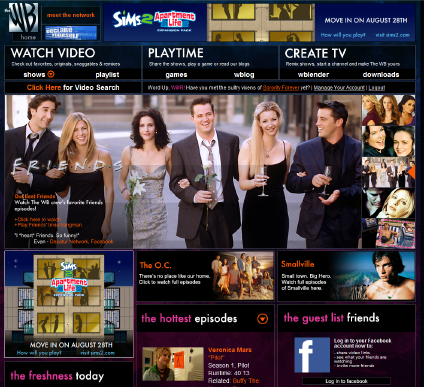-
Digitalsmiths Raises $12M, Focuses on Monetization
Digitalsmiths is announcing a $12M Series B round this morning, led by .406 Ventures, with participation from existing investors The Aurora Funds and Chrysalis Ventures. The company started life focused on video search, but now appears well on its way to successfully morphing into a tier one video management/publishing platform with indexing and analytics serving as key differentiators. I caught up with Ben Weinberger, Digitalsmiths' CEO yesterday to learn more.
Ben explained that Digitalsmiths has been landing customers like TheWB.com, TMZ, Essence.com and others TBA by focusing heavily on helping these content providers monetize more effectively. Monetization is driven by Digitalsmiths' metadata creation and indexing technology that can transform high value content into easily navigable and searchable frame-by-frame segments (this can be seen at TheWB.com).
Improved monetization is the number one challenge for the entire broadband video industry as I've been saying for some time now, and the economic meltdown has only accelerated its importance. The simple fact is that the industry has to learn how to drive more consumption by moving users beyond simple linear playback, and then achieving an ever-higher ROI against each one of these streams with more inventive ad units.
Digitalsmiths is helping accomplish these objectives by first ingesting the whole video file, then running its
 indexing algorithms against it, and finally generating the individual segments. These segments are then more discoverable within the site's own search, but also, importantly, by the outside world, through improved SEO (note there are some relevant comparisons between Digitalsmiths and EveryZing and Gotuit, two other companies I've written about previously). As non-linear, user-friendly experience is the result.
indexing algorithms against it, and finally generating the individual segments. These segments are then more discoverable within the site's own search, but also, importantly, by the outside world, through improved SEO (note there are some relevant comparisons between Digitalsmiths and EveryZing and Gotuit, two other companies I've written about previously). As non-linear, user-friendly experience is the result.Ben said that Digitalsmiths' market acceptance is also being fueled by an innovative, success-based business model that ties its customers' actual gains in video consumption and monetization effectiveness to the company's own compensation. This approach obviously helps instill customer confidence, all the more so in current difficult economic times.
I also spoke briefly yesterday with Maria Cirino, the partner at .406 Ventures who led the round. Of course, it's cliche that VCs think their portfolio companies are the be-all and end-all, but I thought a couple points Maria (who's a heavy hitter in the Boston technology scene due to her success as CEO/co-founder of Guardent, acquired by VeriSign in 2003) made were quite salient.
Specifically, when I asked her about concerns she had regarding the notoriously crowded field of video management/publishing companies that have been around for far longer, she recalled the once similarly crowded web search space, dominated by well-entrenched names (Yahoo, Lycos, Excite, AltaVista, etc.). Google entered late, but broke through by offering a demonstrably better product directly addressing users' key pain point (better search results and user experience). To be clear, Maria was not inferring Digitalsmiths is the next Google (!); rather her point was that "2.0 products" can gain significant traction by tightly focusing on the market's up-to-date needs, especially if they have game-changing technology.
For Maria, Digitalsmiths' proprietary metadata/indexing capabilities, tied directly to improved monetization, are its key ingredients. That's not to say there aren't other competitors bringing their own differentiators to the table, or that content providers' motivations are monolithic, or even that there won't sufficient business to go around for a while. However, in Maria's mind, the key to Digitalsmiths' current success has been to hone in on the market's most critical decision-making driver (i.e. better monetization) and deliver against it.
I'm practically a broken record on the video management/publishing space, as I continue to marvel at the sheer number of competitors and the amount of money invested in the space as indicators of the broadband video industry's ascendance. This space has a lot more room to run and chapters to be written. It's also inevitable that the big boys will eventually follow Comcast and Yahoo (which have acquired thePlatform and Maven, respectively) in, by making their own acquisitions.
What do you think? Post a comment now!
(Note: Digitalsmiths is a VideoNuze sponsor)
Categories: Deals & Financings, Technology
Topics: .406 Ventures, Chrysalis Ventures, Digitalsmiths, Essence, The Aurora Funds, TheWB.com, TMZ
-
TheWB.com Launches Public Beta - Nice Execution, Fuzzy Strategy
TheWB.com's curtain is finally going up, with the site set to officially open for public beta at 11am Pacific Time today. Along with fellow analysts and press, I was given a sneak peek at the site and so I'm able to offer some initial impressions. At first blush, and after having some of my specific questions answered by a WB spokesman, my reaction is that the site is executed well, but that its strategy seems fuzzy.
As many of you know, TheWB TV channel went off the air in September, 2006. In April, 2008 Warner Bros. Television Group announced that it would launch TheWB.com as an online network. The new site contains a mix of about 20 classic WB and Warner Bros. programs and a slew of forthcoming original web-only programs created by big-name talent. Many of the classic programs have cult-like followings and will no doubt find an ardent online audience.
In addition, TheWB site has some nifty features such as a mashup capability called "WBlender" powered by Adobe Premiere Express, video search powered by Digitalsmiths (including full scene-by-scene indexing of all programs which allows search at the dialogue, character, location, episode, session and series level) and a pretty deep Facebook app allowing users to share content back and forth.
While these features all will eventually raise the bar for other sites, certain aspects are not yet fully implemented. For example, WBlender today only offers users a paltry 30 or so pre-selected clips and just 6 soundtracks to mash. Later this year the selection will widen when the WBlender is married to the video search feature, allowing all scenes from all shows to be mashed together. It's not clear whether users will be able to clip specific segments themselves from favorite episodes or not.
Overall, the site's execution is solid except for a few minor personal quibbles that aren't worth spending time on here. I believe a far bigger issue is the site's fuzzy strategy. A WB spokesman told me that "TheWB.com is not meant to be an archival library of every episode of every show ever made, but rather an entertainment destination that gives our viewers a lot of great entertainment, along with a reason to come back again tomorrow." This is meant to give "our programmers the ability to create themed programming blocks that mesh with our audience's sensibilities."Yet how TheWB.com actually translates this strategy into which programs and episodes are available on the site at any given time is where I think it's going to generate considerable user frustration, not to mention a lack of competitiveness with its own syndication outlets.
Three shows "Friends," "Buffy the Vampire Slayer" and "Angel" illustrate the point. With "Friends" just 7 episodes are currently available on the site, inexplicably from 7 different seasons. If there's a thematic thread, it is neither stated on the site, nor intuitive to me. If I want to watch a specific episode from a particular season, I'm out of luck. Meanwhile TheWB.com shortchanges "Angel" and "Buffy" fans by offering just the first 5 episodes of each, while Hulu, as one example, already offers 22 and 34 episodes each program, respectively.
I think it will quickly become evident that TheWB.com's strategy to "program" its online network is at odds with the on-demand desires of users seeking unfettered access to the full catalog of all programs. Here we see legacy linear TV thinking being grafted onto a high-potential online platform, with the result being a confusing sub-par user experience.
I know I've said this before, but I continue to believe that Hulu is the reigning broadband video user experience king. Having cracked the code on how to deliver fast growth and user loyalty, TheWB.com would be wise to go to school on Hulu and borrow liberally from lessons it has already learned and acted on well.
Still, in fairness, this is still just the beta of TheWB.com. There's a lot to be excited about here, but getting the site's strategy aligned with user expectations is a key building block to eventual success.
What do you think? Post a comment now.
Categories: Broadcasters
Topics: Hulu, TheWB.com, Warner Bros.
-
New Warner Bros' Sites Showcase Broadband's Abundance
The news yesterday that Warner Bros Television Group plans to launch TheWB.com as an online outlet to offer its catalog of popular programs and KidsWB.com to house its animated favorites are further reminders that broadband's infinite shelf space creates all kinds of new opportunities for broadcasters and studios ready to experiment and be creative.
I regard these moves as the latest evidence that industry players are beginning to understand how programming in a broadband world differs from business-as-usual approaches. If there is one word that captures the essence of the traditional world it would be "scarcity." Scarcity of time slots, distributors, eyeballs, financing, brands, advertising dollars, ideas, etc. The whole broadcasting and studio paradigm is built on a zero sum - and legitimate - idea that only a very small handful of all creative pursuits can succeed at any one time.
Broadband explodes the scarcity model, introducing a world of abundance in which every scarcity constraint is alleviated or erased. Abundance thinking has guided online retailers for years: offering incremental inventory is dirt-cheap, and if made easily discoverable, it will find its buyers. In fact, as the incongruous popularity of "Arrested Development" on Hulu already shows, latent demand for catalog programming can actually be quite strong.
Evidence is growing that other video providers also understand the abundance concept. Recently other networks and studios have also launched their own efforts to monetize catalog programming. At my recent NAB panel, the head of CTV's 2012 Olympics coverage noted that ALL Olympic activity will be available for online viewing (their mantra is "Every Second Counts"). Also at NAB, I was introduced to a stealthy new initiative to make available high-quality archived video that has never been available online. I expect plenty more examples to come.
To be sure, broadband's abundance creates all kinds of new challenges: More audience fragmentation. New promotion and user navigation issues. More monetization complexity. New operational and management tasks. And so on.
Yet broadband's abundance should be viewed as a direct challenge to the historical scarcity model on which broadcasters' and studios' strategies have long been built. Industry participants who recognize the new world order and embrace it will be best-positioned to succeed.
What do you think of how broadband's abundance changes things? Post a comment and let everyone know!
Categories: Broadcasters, Studios
Topics: KidsWB.com, TheWB.com, Warner Bros
Posts for 'TheWB.com'
|




